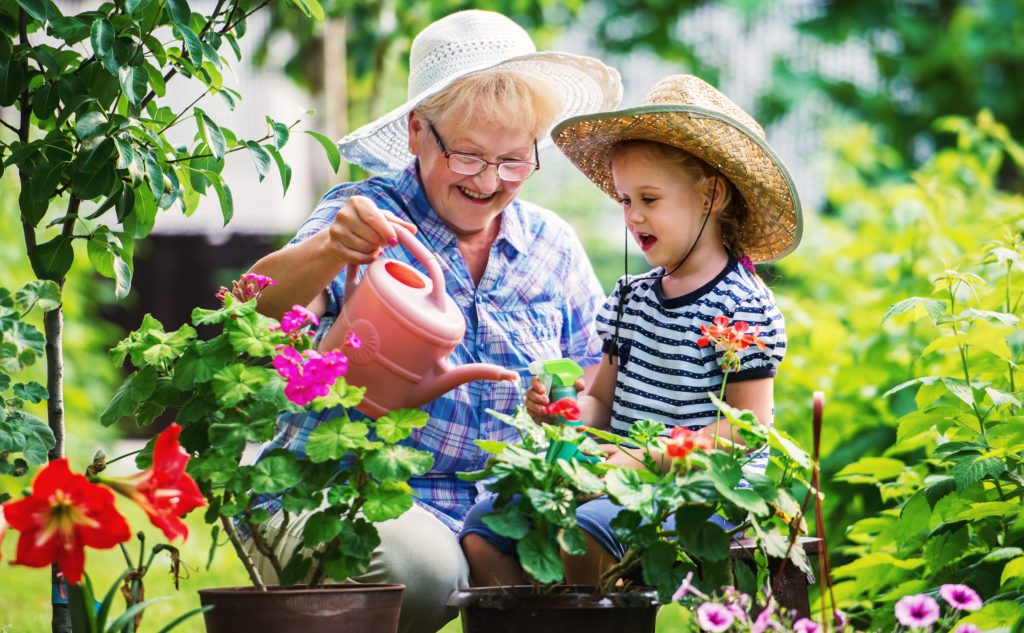
With our vision to be a Precinct of ‘people transforming lives’, our mission goes beyond simply doing ‘great technology and good business’ – we’re committed to ‘doing good’.
Intergenerational care uniting young and old
ABC television’s “Old People’s Home for 4-Year-Olds”, brought smiles to faces young, old and in between, as it demonstrated how rich and beneficial the connections between generations can be.
Emeritus Professor Anneke Fitzgerald, a health management research expert, oversaw Griffith University’s five-year Intergenerational Care Project and was involved in both pre and post-production for the popular docuseries.
With a small team of volunteers, she’s now established the not-for-profit Australian Institute for Intergenerational Practice (AIIP), based at Cohort Innovation Space in the Precinct, to address the gaps between the identified benefits of intergenerational care and current practices in aged, child and community care.
“Through AIIP we seek to educate, train and support care providers to formalise the beneficial intergenerational activities that occur in families and communities within care settings, using evidence-based practices, which are guided by research,” says Professor Fitzgerald.
“By learning with and from each other, these activities generate inclusive, age-friendly communities for children, teenagers, older adults, the workforce, volunteers and the wider community.”
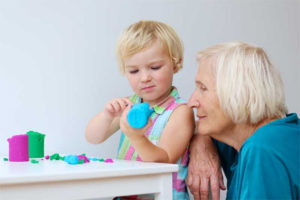
With an ageing population – the number of people in home care has tripled in the last decade, while numbers in permanent residential aged care increased by 13%, according to GEN Aged Care data (2019-20) – there is a significant focus on improving the wellbeing of older people, particularly in light of major issues spotlighted in the Royal Commission into Aged Care Quality and Safety and ongoing concerns during the pandemic.
Purposeful intergenerational activities have been proven to give older people a sense of purpose and improved mood; reduce or delay cognitive and physical decline, including dementia; reduce social isolation; enhance dignity and encourage older people to remain living at home for longer.”
Of course, the benefits run both ways, with children improving pro-social behaviours of sharing, helping and cooperating while gaining increased confidence and communication skills and evidence showing a decreased likelihood of juvenile delinquency later in life.
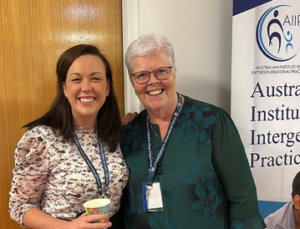
AIIP Interim CEO Emma Woods believes the Gold Coast Health and Knowledge Precinct provides a unique opportunity, through co-location of a new aged care facility, including a training centre, close to the innovative early learning and child development ‘living lab’, being established in the Proxima development.
“The co-location, together with opportunities to have input into the design of both facilities, will hopefully enable us to be able to demonstrate best-practice in intergenerational care,” Ms Woods says.
“To be able to work closely with paediatric researchers and early childhood educators in Proxima, together with being involved in training of the next-generation aged care workforce, will enable us to easily translate research and pilot programs that can then be expanded across Australia.
Our vision is to benefit the whole community by reducing ageism and the care burden in society, while improving satisfaction for care workers and volunteers.”
Disrupting the charity sector with micro-philanthropy
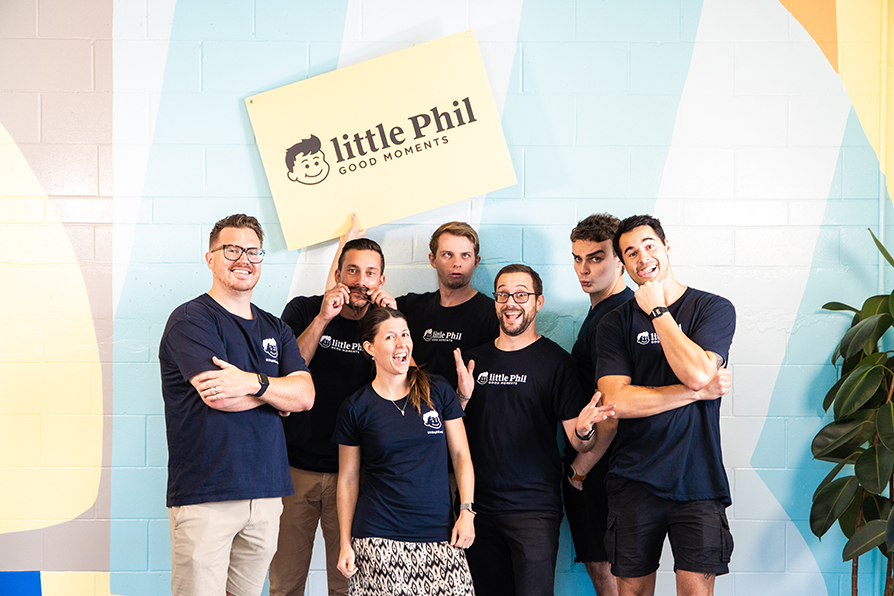
In 2017, Little Phil’s CEO and Co-founder, Josh Murchie, saw the dire need for a better way to support charities after returning home from a volunteering mission in Peru.
With the simple mission at inception, “charitable giving is broken, we’re going to fix it”, Little Phil was born.
“Charities and not-for-profits are failing to keep up and engage younger generations, albeit the most socially in touch,” says Josh.
I set out to create the platform I wanted to use. The main difference with our platform is trust and transparency, alternative fundraising streams, and a central focus on donors rather than just charities.”
Little Phil eliminates the issue of third-party fundraisers taking a big share of donations, rigorously vets charities to ensure that only genuine causes can raise funds via the platform, and then provides access to their donor base, corporate fundraising and new web3.0 fundraising streams and opportunities such as crypto and Non-Fungible Tokens (NFTs).
According to Josh, who was a founder of Griffith University’s Entrepreneur’s Club as an undergraduate and then Masters student, almost all crowdfunding platforms are transactionally focused, without nurturing the donor experience for a lifetime impact continuum.
“The Little Phil platform provides our charity partners with the tools to engage and build long-lasting relationships with their supporters and puts donors at the heart of what we do.”
The last quarter of 2021 saw the team move into Cohort and launch the Beta version of their CSR (Corporate Social Responsibility) initiative ‘Company Giving’, an alternative to outdated and under-subscribed workplace giving programs.
They say 3.3 million workers are employed in companies with workplace giving programs, yet only five percent choose to give in this way. At the same time, competition to attract and retain skilled workers is tight, with many potential employees, along with customers and corporate partners, looking to a company’s social impact as a key factor in decision-making.
“We’ve created a plug and play ecosystem that lets companies individually empower their employees whilst displaying their social goodwill to the world,” says co-founder Craig Gillam.
“Rather than giving a lump corporate donation once a year, we enable companies to diversify this donation amongst team members while retaining relevant tax benefits and displaying goodwill to customers and investors, and while their team members give to what they care about.”
Telco amaysim (Optus), Australia’s fourth largest mobile services provider, has partnered on the launch.
Another big focus will be on what they believe is their world-first move into utilising NFTs to fundraise for multiple causes. An NFT is a digital asset representing real-world objects like art, music, in-game items, and videos bought and sold online mainly using cryptocurrency and mostly encoded with the same underlying software as many cryptos.
Little Phil’s first project saw it partner with Korean music-star DJ Soda, along with NFT digital trading platform Xillion, to deliver to the market a digital art piece valued at AUD$2.8 million with 12.5 percent (an estimated AUD$350,000) of this total to be allocated to charitable causes.
Surrounded by innovators in the Precinct, the Little Phil team, many of whom are Griffith alumni, feel right at home.
“Being a part of the GCHKP and Cohort community allows us to be amongst other peers solving complex problems and pulling off remarkable goals of their own,” says Craig.
Tymlez drives Cohort sustainability through blockchain technology
ASX-listed Tymlez is on a mission to transform data into sustainability by enabling transparent, auditable, and verifiable decarbonisation – and it’s thinking global while acting local to create the city’s first energy community.
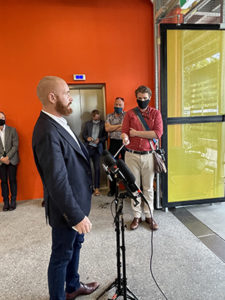
Having moved its Australian HQ into the Precinct in mid-2021, it’s moving its mission forward by recently joining the Australian Hydrogen Council (AHC) to offer a solution to guarantee the origin of green hydrogen and further support organisations to meet environmental, social, and governance (ESG) targets, while also focusing on sustainability at its homebase at Cohort.
Utilising Behind-The-Meter energy monitoring devices capturing site-wide energy usage, the TYMLEZ Smart Energy Data Solution is being deployed across Cohort’s buildings as part of a pilot with the Queensland Government, allowing access to real-time consumption data, powered by blockchain technology.